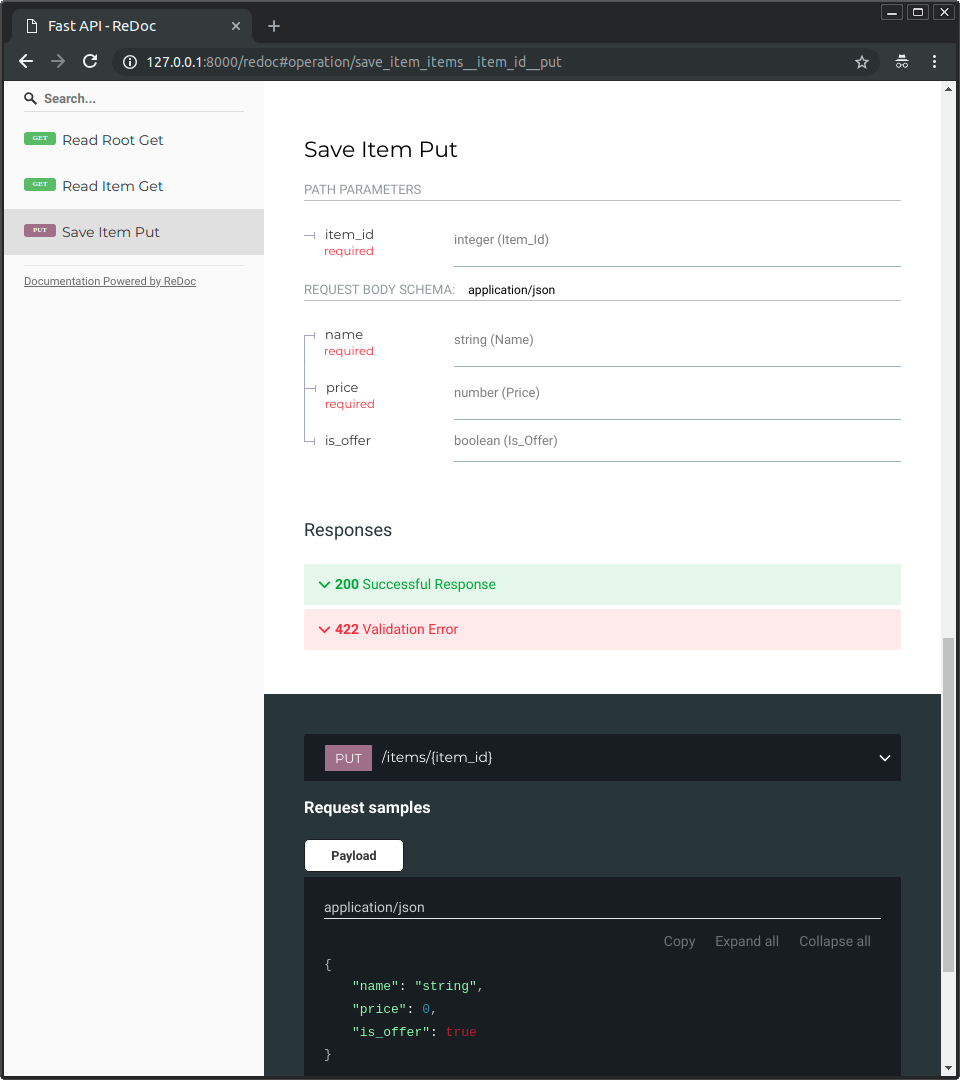- Sort Score
- Result 10 results
- Languages All
Results 1 - 10 of 10 for function (0.18 sec)
-
docs/en/docs/tutorial/first-steps.md
### Step 4: define the **path operation function** This is our "**path operation function**": * **path**: is `/`. * **operation**: is `get`. * **function**: is the function below the "decorator" (below `@app.get("/")`). ```Python hl_lines="7" {!../../../docs_src/first_steps/tutorial001.py!} ``` This is a Python function.
Plain Text - Registered: Sun May 05 07:19:11 GMT 2024 - Last Modified: Thu May 02 22:37:31 GMT 2024 - 12K bytes - Viewed (0) -
pyproject.toml
"I", # isort "B", # flake8-bugbear "C4", # flake8-comprehensions "UP", # pyupgrade ] ignore = [ "E501", # line too long, handled by black "B008", # do not perform function calls in argument defaults "C901", # too complex "W191", # indentation contains tabs ] [tool.ruff.lint.per-file-ignores] "__init__.py" = ["F401"] "docs_src/dependencies/tutorial007.py" = ["F821"]Plain Text - Registered: Sun May 05 07:19:11 GMT 2024 - Last Modified: Thu May 02 22:37:31 GMT 2024 - 9.3K bytes - Viewed (0) -
docs/en/docs/release-notes.md
* Add note in [Response Model docs](https://fastapi.tiangolo.com/tutorial/response-model/) about why using a function parameter instead of a function return type annotation. PR [#109](https://github.com/tiangolo/fastapi/pull/109) by [@JHSaunders](https://github.com/JHSaunders). * Fix event docs (startup/shutdown) function name. PR [#105](https://github.com/tiangolo/fastapi/pull/105) by [@stratosgear](https://github.com/stratosgear). ## 0.10.2
Plain Text - Registered: Sun May 05 07:19:11 GMT 2024 - Last Modified: Fri May 03 23:25:42 GMT 2024 - 388.1K bytes - Viewed (1) -
docs/en/docs/advanced/settings.md
Plain Text - Registered: Sun May 05 07:19:11 GMT 2024 - Last Modified: Thu May 02 22:37:31 GMT 2024 - 15.7K bytes - Viewed (0) -
docs/en/docs/advanced/openapi-callbacks.md
Plain Text - Registered: Sun May 05 07:19:11 GMT 2024 - Last Modified: Thu May 02 22:37:31 GMT 2024 - 7.7K bytes - Viewed (0) -
docs/en/docs/features.md
You write standard Python with types: ```Python from datetime import date from pydantic import BaseModel # Declare a variable as a str # and get editor support inside the function def main(user_id: str): return user_id # A Pydantic model class User(BaseModel): id: int name: str joined: date ``` That can then be used like: ```Python
Plain Text - Registered: Sun May 05 07:19:11 GMT 2024 - Last Modified: Thu May 02 22:37:31 GMT 2024 - 9.3K bytes - Viewed (0) -
README.md
 ### Recap In summary, you declare **once** the types of parameters, body, etc. as function parameters. You do that with standard modern Python types. You don't have to learn a new syntax, the methods or classes of a specific library, etc. Just standard **Python**. For example, for an `int`:
Plain Text - Registered: Sun May 05 07:19:11 GMT 2024 - Last Modified: Thu May 02 22:37:31 GMT 2024 - 22.6K bytes - Viewed (0) -
docs/pt/docs/index.md
* Verifica que tem um atributo obrigatório `price` que deve ser `float`. * Verifica que tem an atributo opcional `is_offer`, que deve ser `bool`, se presente. * Tudo isso também funciona para objetos JSON profundamente aninhados. * Converter de e para JSON automaticamente. * Documentar tudo com OpenAPI, que poderá ser usado por: * Sistemas de documentação interativos.Plain Text - Registered: Sun May 05 07:19:11 GMT 2024 - Last Modified: Mon Apr 29 05:18:04 GMT 2024 - 18.6K bytes - Viewed (0) -
docs/fr/docs/index.md
### En résumé En résumé, vous déclarez **une fois** les types de paramètres, <abbr title="en anglais : body">le corps</abbr> de la requête, etc. en tant que paramètres de fonction. Vous faites cela avec les types Python standard modernes. Vous n'avez pas à apprendre une nouvelle syntaxe, les méthodes ou les classes d'une bibliothèque spécifique, etc. Juste du **Python** standard.
Plain Text - Registered: Sun May 05 07:19:11 GMT 2024 - Last Modified: Mon Apr 29 05:18:04 GMT 2024 - 22K bytes - Viewed (0) -
docs/en/docs/index.md
 ### Recap In summary, you declare **once** the types of parameters, body, etc. as function parameters. You do that with standard modern Python types. You don't have to learn a new syntax, the methods or classes of a specific library, etc. Just standard **Python**. For example, for an `int`:
Plain Text - Registered: Sun May 05 07:19:11 GMT 2024 - Last Modified: Thu May 02 22:37:31 GMT 2024 - 19.8K bytes - Viewed (0)